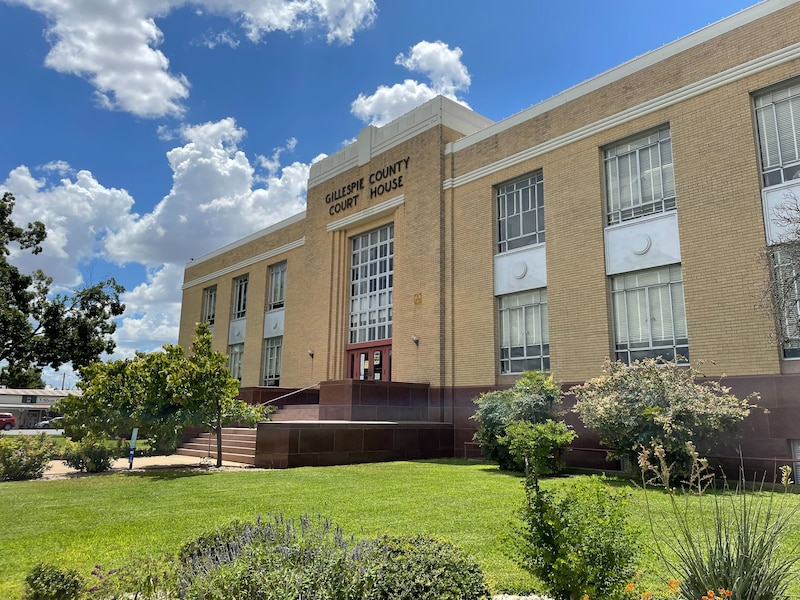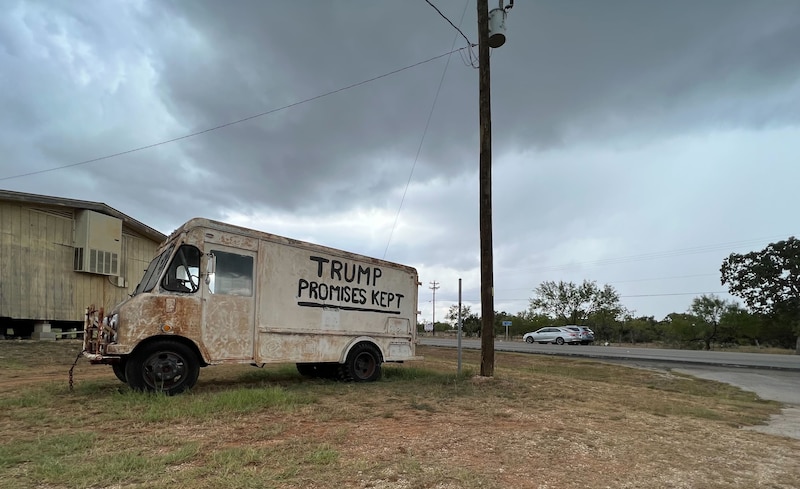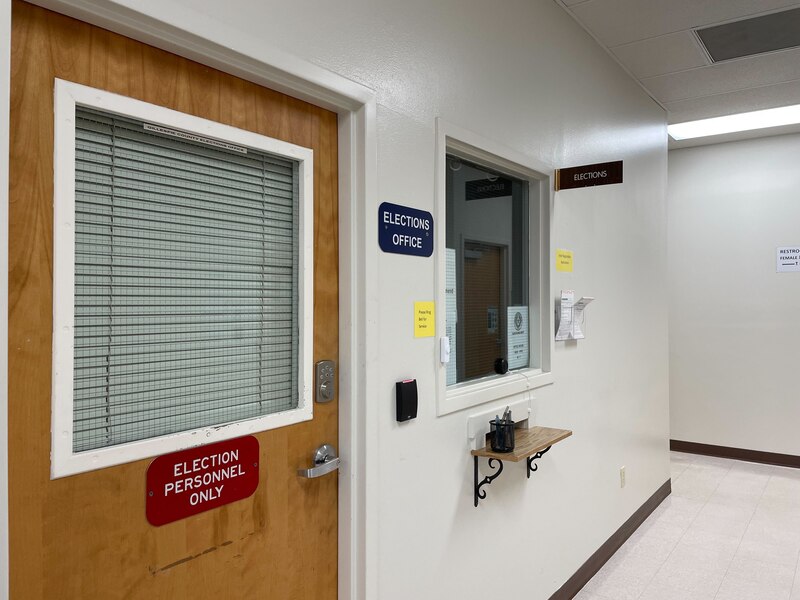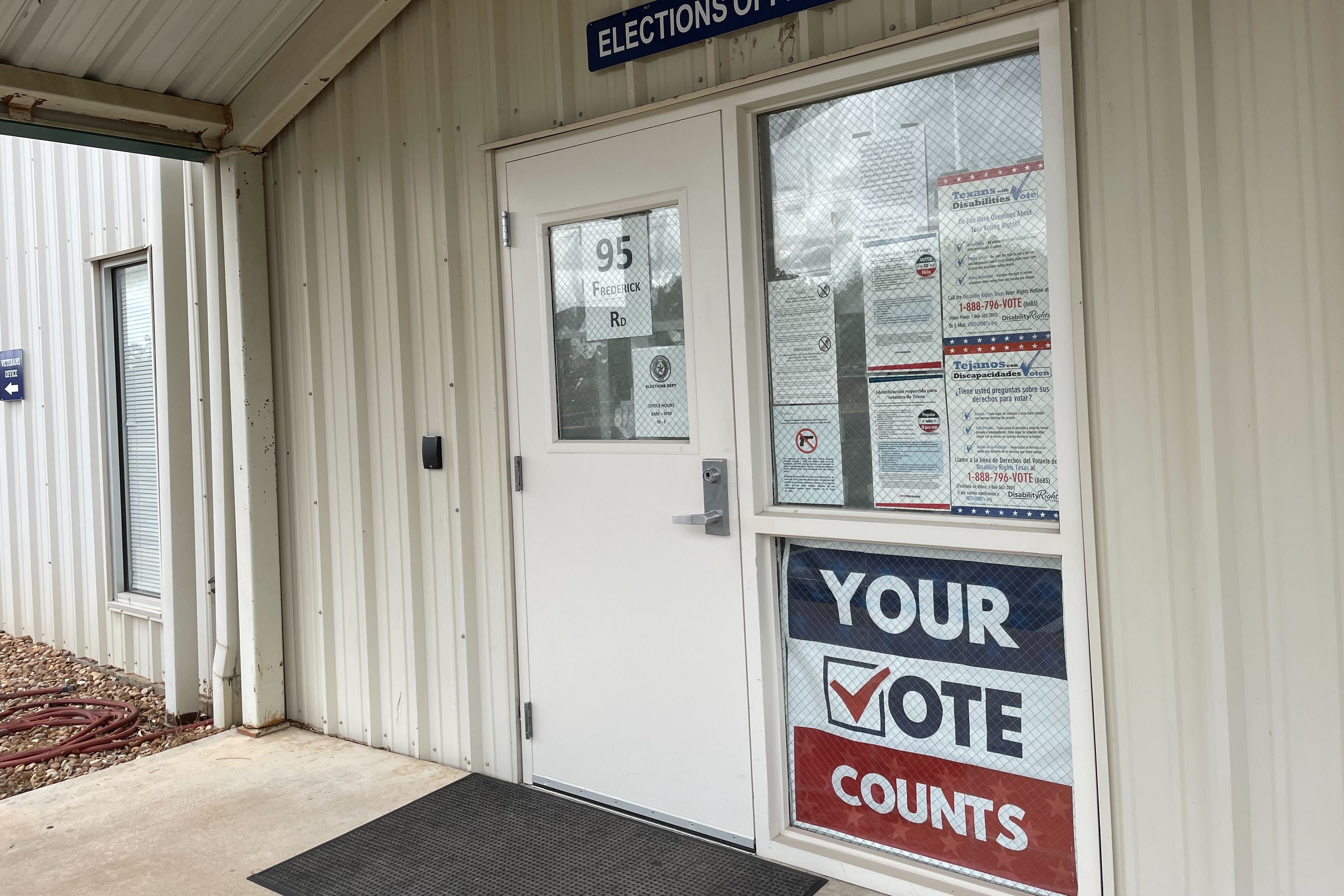Last November’s sleepy constitutional amendment election nearly came to blows in Gillespie County, a central Texas county known for its vineyards. A volunteer poll watcher, whose aggressive behavior had rankled election workers all day, attempted to force his way into a secure ballot vault.
The burly man was repeatedly blocked by a county elections staffer. Shouting ensued. “You can’t go in there,” the staffer, Terry Hamilton, insisted to the man, who towered over Hamilton. “We can see anything we want!” the poll watcher and his fellow election integrity activists yelled, according to an election worker who witnessed the scene. They accused Hamilton and Elections Administrator Anissa Herrera of a variety of violations of the state elections code, which they quoted, line by line.
“Oh Lord, they can cite chapter and verse,” recalled Sue Bentch, a Fredericksburg election judge who saw the confrontation that night. “But you know, just as the devil can cite scripture for its own purposes it seemed to me that it was often cited out of context and misinterpreted.”
“Finally, I called the sheriff’s officer,” said Bentch. The officer barred the activists from the vault. “Poor Terry was coming to fisticuffs.”
Previous elections had been no better. In 2020, a poll watcher called the cops on Herrera and filmed election employees in a dark parking lot. The same year, Herrera received a clutch of obscene, often racist, emails. And in 2019, a group of activists filed suit after Fredericksburg voters overwhelmingly rejected an obscure public-health ballot measure. That election, the activists argued, had been irrevocably tainted by fraud.
Three years of these hostilities were clearly enough for Herrera, who resigned this month.
The rest of the office staff — one full-time employee and one part-time employee — also departed, leaving the elections office completely vacant.
Recent media coverage of the exodus attributed it to threats of the type that have become common since the 2020 presidential election. In fact, Votebeat’s review of court documents, emails, and social media postings show Herrera and others struggling to combat fringe election conspiracy theories in Gillespie County long before former President Donald Trump encouraged his supporters to question the integrity of the 2020 vote.
In Gillespie County in 2019, the fringe was focused on fluoride.
The city charter amendment that sparked a crusade against Herrera, only months after she took the post as elections director, was a proposal to remove fluoride from Fredericksburg’s water system. The measure failed, and the activists behind it suspected malfeasance. Members of the group insisted they’d been unlawfully prevented from closely observing a recount of votes and sued the city’s then-mayor.
Then, as Trump’s rhetoric began to heat up closer to November 2020, the Gillespie County Republican Party brought energy and structure to what was, up to that point, a small local movement. In the two years since, as lawmakers rewrote Texas’s election laws and Herrera’s working hours ballooned, she found it impossible to lead a normal working life in the elections office.
“The threats against election officials and my election staff, dangerous misinformation, lack of full time personnel for the elections office, unpaid compensation, and absurd legislation have completely changed the job I initially accepted,” Herrera wrote in her resignation letter, dated August 2. “The life commitment I have given to this job is unsustainable.”
Born and raised in Gillespie County, Herrera and her family have been active members of the community for generations. Herrera’s grandmother established the county’s first Mexican restaurant in the 1970s. In 2019, when the county first created a standalone elections office, separating it from the clerk’s office where Herrera had worked for years assisting with elections, she took the reins. She was excited to be selected for “her dream job,” those who know her said.
Records and interviews show that, in the three years that followed, the job quickly consumed her life.
Herrera herself wouldn’t talk about it. “I am done with this career, unfortunately,” Herrera told Votebeat last week, declining to comment further.
But in contrast with the rancor from activists, county officials spoke highly of Herrera’s work ethic.
“She’d given everything to this job,” said Cathy Collier, the chair of the county’s Democratic party and member of the county’s elections commission.
“That’s a lot of work—a tremendous amount of work that she does,” said county Sheriff Buddy Mills, an elected Republican. “As far as I can tell you, everything is top notch.”
“I don’t think anyone is under the assumption that the election would be as smooth as if we still had Anissa,” said Mark Stroeher, the county judge, also an elected Republican. “I don’t think it’ll be that easy to find someone.”
The county next door, Blanco, has been without an elections director for two years.
A fracas over fluoride
Anti-fluoride groups have been active in the United States for decades, but have experienced a bump in popularity in recent years. By 2018, more than 70 cities in the United States had banned adding fluoride to their water systems, including some in Texas. Fredericksburg, the largest city in Gillespie County, held its own vote in 2019.
For years, Texas’s most vocal critic of fluoridated water has been Laura Pressley of Williamson County, a perennial candidate for office in central Texas who has yet to win a race. Local press often highlights her advocacy of disproven conspiracy theories. She has appeared on Alex Jones’ programming, and has said that “something was planted” in the World Trade Center on Sept. 11. In recent years, she has become a self-styled poll watching expert and vocal opponent of electronic voting systems, training hundreds of people across the state in what election administrators say are disruptive practices that harm election integrity.
“Our elections are the representation of free will, and if we can’t trust that our free will is being represented legally and accurately, then God’s will is being thwarted,” she said at a meeting in Hood County in 2021. In recent years, she’s filed unsuccessful lawsuits against counties across the state over a variety of alleged voting problems.
Pressley did not respond to requests for an interview.
Records show Pressley became involved in a small anti-fluoride movement in Fredericksburg, teaming up with several locals, including Jeanette Hormuth and Jerry Farley. Their group — Clean Water Fred — began a campaign to remove fluoride from the city’s water, gathering enough signatures to prompt a special election on the issue, held in November of 2019.
In a low-turnout election, Fredericksburg residents soundly rejected the measure in an initial count of 1,258 votes to 742.
It wasn’t a close result, but Clean Water Fred suspected fraud, and they gathered enough signatures to force a recount. The Dec. 2, 2019 recount confirmed the results, even adding three “no” votes to the original total.
Pressley came to town for the recount, and affidavits filed in the group’s lawsuit and interviews with people present detail behavior by Pressley that was disruptive. The affidavits — filed by Pressley, Hormuth, and Farley — also show she instructed others in the group to engage in similar behavior, and they did as she instructed.
Pressley, for example, told Farley to join her in repeatedly saying, “I challenge the result” after the counting of each ballot. When the pair was asked to stop, he and Pressley instead said it under their breath. After Pressley was admonished by county staff for hovering near the table where volunteers were counting, at one point sitting down alongside them, she told Hormuth to call the secretary of state’s office to complain. Hormuth did so.
Hormuth declined to comment for this piece, citing the pending litigation.
The group remained unsatisfied even after the recount, and Hormuth and Farley filed a lawsuit on Dec. 31.

The lawsuit contends that because of “so many material mistakes, illegalities, irregularities, and potential fraud that occurred in the administration of the election and the tabulation of election results” that “the true outcome of the election cannot be ascertained.”
Pressley was the group’s go-to expert for election questions. “She was ‘coaching’ that group in the election with the fluoride issue,” Stroeher wrote in a 2020 email to the county attorney.
Records and interviews suggest the group’s behavior continued in 2020 and beyond.
Angela Smith, a local activist who wrote an affidavit in support of the group’s 2019 lawsuit, served as an early voting poll watcher in October of 2020. When early voting ended for the day, Smith was not allowed back into the elections building. In an email to the county attorney and county judge, Herrera wrote that Smith then called local police before parking outside of the office and beginning to film.
“Ms. Smith was blatantly filming 5 of my temporary elections clerks without their consent as they left the building, making them feel uncomfortable and intimidated,” Herrera wrote to other county officials. “I am concerned one or more of my temporary clerks may not return due to this incident.”
Smith declined to comment for this story.
County Attorney Steven Wadsworth forwarded the email to local police. “Sadly, I think that having some extra patrols around [the counting facility] tonight and tomorrow is prudent,” Wadsworth wrote the day before the 2020 election. “I think having some extra patrols around the courthouse area and all polling locations - sadly - is also prudent.”
Wadsworth did not respond to multiple requests for an interview.
The battles even made local news.
A report by KXAN shows Hormuth and Smith explaining that they were prevented from poll watching in 2019 and 2020, and had filed a complaint with the secretary of state regarding the matter. The station identified the pair as Republicans. The TV station reached out to Herrera, Hamilton (the full-time hourly worker in the office), Stroeher and Wadsworth for comment but they declined. An email obtained by Votebeat through a public records request suggests it’s because they thought Pressley might be behind the story.
“I do not know who made the complaint, but if Ms. Pressley did so, be aware that she has a history of making these types of complaints and then filing a civil lawsuit as well,” Wadsworth wrote. “I think it would be prudent to approach the situation as if litigation is pending.”
The result was a one-sided news story that offered no defense from the county. The secretary of state took no action against the office as a result of the complaint, but hate mail flowed into Herrera’s inbox from across the country anyway.
“Fucking Anissa! Go back to Mexico bitch! You are obstructing the election process and will be prosecuted!” wrote one emailer, the day after the KXAN segment aired. He did not respond to a request for comment.
The same week, a woman who said she was from California emailed Herrera, linking to the piece. “BITCH !! YOU GOT CAUGHT IN A LIE,” she wrote. “LEARN TO OBEY STATE AND FEDERAL LAW … OR GO TO JAIL!” Days later, the woman emailed again. “WE JUST TURNED YOUR NAME IN TO THE LT. GOVERNOR’S OFFICE FOR INVESTIGATION,” she wrote. The day before, Texas Lt. Gov. Dan Patrick had offered a cash bounty for proof of voter fraud.
“AND BY THE WAY … YOU’RE IN THE UNITED STATES OF AMERICA NOW. TRY TO REMEMBER THAT … OK?” she concluded. The emailer did not respond to an emailed request for comment.
“I guess I will be receiving these daily,” Herrera wrote, forwarding the woman’s complaints to county leadership. “Any idea who I report them to?”
By the time the local news piece aired, emails show Moe Saiidi, the chair of the county GOP, had begun repeatedly contacting Herrera to complain about poll worker treatment and demand changes to procedure that were not allowed under state law. They’d also recruited poll watchers, warning them to watch out for fraud. Saiidi did not respond to multiple requests for an interview.

“They lost an election, so they probably think there’s something wrong,” Mills, the sheriff, said in an interview after Herrera’s departure this month. Smirking, he looked under a stack of paperwork on his desk and found a copy of the film “2000 Mules,” created by Texas group True the Vote with conservative firebrand Dinesh D’Souza. It purports to “expose” fraud in the 2020 election, but has been soundly debunked and roundly criticized. He said someone mailed the DVD to him from Houston.
Mills said he watched the movie. He didn’t believe the underlying claims, but said he understood how others would.
Only days before Herrera’s final day as elections administrator, the local GOP hosted a watch party for the movie. In July, they’d hosted an informational event that cost guests between $5 and $20. It was a speech by Alan Vera — a widely known Republican activist on election issues who helped found True the Vote.
Low pay, long hours
Herrera is one of a growing number of elections officials who have walked away from their jobs since the 2020 election, and the reasons offered in her resignation letter echo concerns ratcheting around the country. The wave of departures among capable, dedicated election staff is seen by many experts as a looming problem with repercussions for future elections. In Texas, nearly 40 election administrators have quit in the last two years.
Those who worked with Herrera said she and her staff routinely voiced frustrations with the long hours, which had grown even longer and more stressful since Texas began further restricting voting regulations and stepping up penalties for administrative errors after the 2020 election.
“People don’t realize just how much the job takes,” said Collier. “They work until late at night. They’re there early in the morning, on holidays. Anissa would send out something I needed to know and I would notice that the email was sent out at like 1 o’clock in the morning.”

The county posted a three-page job opening for Herrera’s position this week. The starting salary is listed at about $54,000. At the time of her resignation, Herrera made just over $45,000, though she was offered a raise to the listed rate, which would have taken effect in October had she stayed. Gillespie officials said Herrera’s sole full-time employee, Hamilton, who’d nearly come to blows with poll watchers, made $15.19 an hour. The only other staffer, who worked part time, made $11.67 an hour. The cost of living in Fredericksburg — a Hill Country hotspot popular for bachelorette parties and wine-fueled vacations — comes at a premium. One ranking recently named it the most unaffordable city in the state.
Before she resigned, Herrera had asked the county for two additional full-time employees. Only one was approved, and it would not be advertised until well after the time counties are expected to have begun preparing for the November election.
The first staffer to quit, according to Stroher, was the part-time employee. Then, Hamilton resigned to run as a write-in candidate for county treasurer. That left Herrera faced with running the upcoming election entirely on her own. It was, it seems, the last straw.
David Becker is the executive director and founder of Center for Election Innovation & Research. His nonprofit works with election officials nationwide and provides legal assistance to election officials who are threatened with frivolous criminal prosecution, harassment, or physical violence, though he hasn’t yet worked with Gillespie County.
“It’s not surprising that some of them are saying, ‘Enough’ and ‘I can’t do this anymore’. ‘I’m inadequately resourced, inadequately paid and the requirements that are being placed upon me are not helping voters. They’re not helping elections be more secure,’” he said.
With the midterms less than three months away, the outlook for Gillespie County’s elections looks shaky. The secretary of state’s office will have to step in to train other county employees, only some of whom have previously worked elections, to manage voting in November — a far cry from the years of elections management experience Herrera brought to her position. And in a county now packed with dozens of angry activists scrutinizing every move the county makes, experts say controversy there is unlikely to die down simply because Herrera resigned.
“If you lose your professional election officials who are experienced in these procedures, who understand the equipment, understand the records, who understand the legal requirements, you can end up in a really bad place,” Becker said. “I do worry about what voters are going to find when they go to the polls if there aren’t experienced professional election administrators.”
Collier, the chair of the county Democratic Party, is also worried.
“If you know any county clerk or elections administrator, you know that these people are fanatics about making things absolutely accurate and absolutely fair. It’s their passion and their job and Anissa was no different than that, nor was her staff,” she said.
“She was meticulous about getting the job done. It’s going to be very difficult to replace her.”
Natalia Contreras is a reporter for Votebeat in partnership with the Texas Tribune. Contact Natalia at ncontreras@votebeat.org.
Votebeat editorial director Jessica Huseman contributed research to this report.



